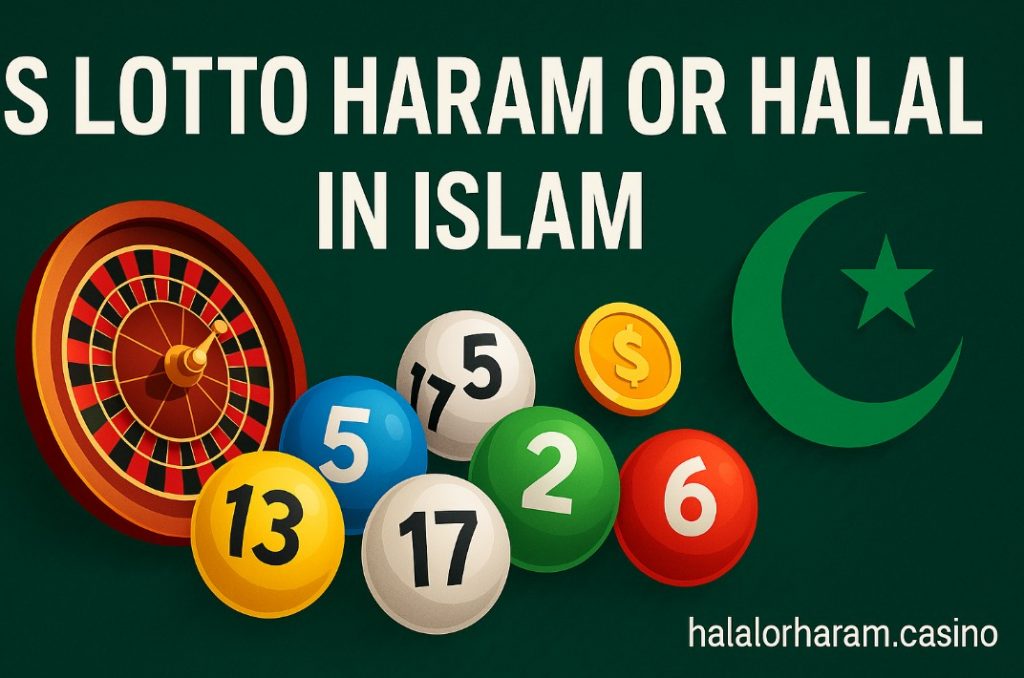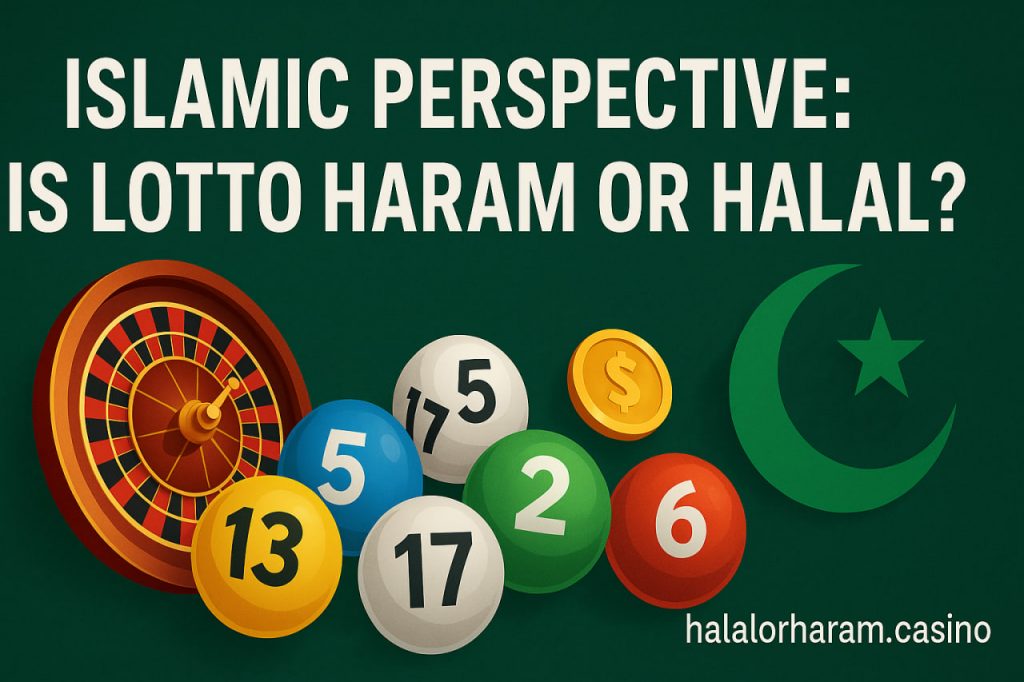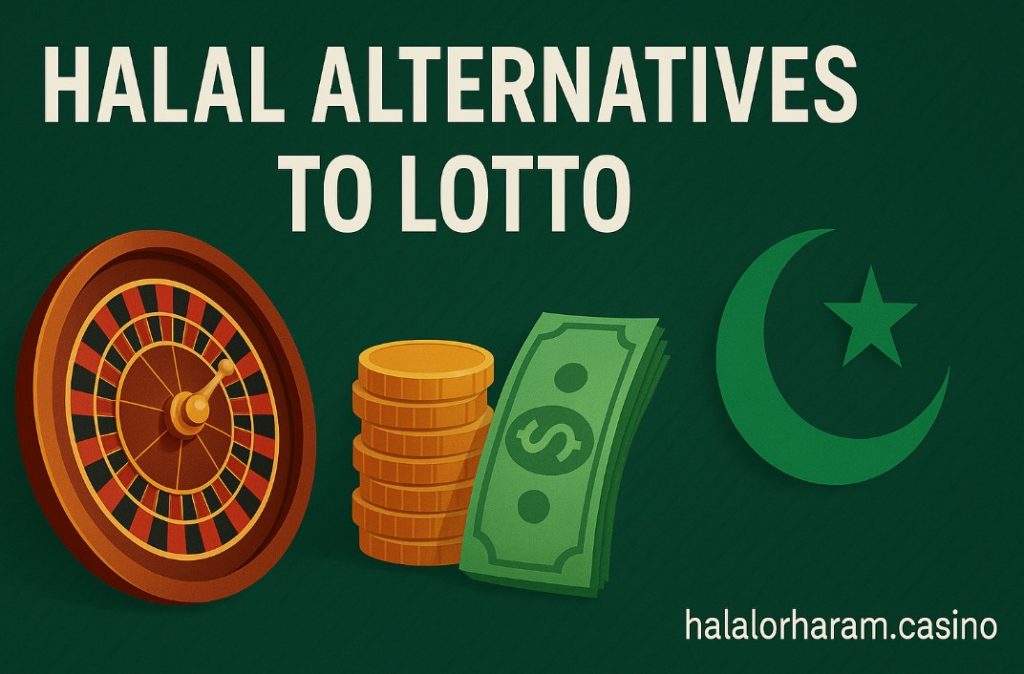Is Lotto Haram or Halal in Islam?

The question “Is lotto haram or halal in Islam?” continues to spark debate and concern among Muslims across the globe. With the rise of digital technology, gambling and lottery-based games have become more accessible than ever before. Online platforms, mobile apps, and televised national draws make participating in the lotto as easy as a few taps on a smartphone. This accessibility, combined with the prospect of winning vast amounts of money, leads many Muslims to question whether participating in the lotto aligns with their faith. As Muslims strive to lead lives rooted in halal (permissible) practices, it becomes crucial to understand how Islamic teachings view such games of chance.
This extensive article aims to explore the Islamic perspective on lotteries by examining primary Islamic sources—the Qur’an and Hadith—along with insights from respected scholars and real-world implications. Whether you are new to Islam or a practicing Muslim seeking clarification, this guide will offer valuable information to help you make informed decisions.
What Is Lotto?
Lotto, or lottery, is essentially a form of gambling where individuals purchase a ticket or entry with the hope of winning a prize, typically cash. Winners are selected through a random drawing, which means the result is based entirely on chance. There are many different formats, but all share the same fundamental principle: players pay a small amount for the opportunity to win a larger reward.
Lotto is marketed in various ways depending on the region, and often includes a strong promotional push through television, digital media, and retail stores. It is sometimes presented as a form of entertainment or even as a way to contribute to charity or public funding.
Common Types of Lotto:
| Type of Lotto | Description |
|---|---|
| National Lotteries | State-run games where a portion of proceeds may go to public works or social services. |
| Scratch Cards | Instant-win tickets that reveal results upon scratching off a coated surface. |
| Online Lotteries | Internet-based games available across borders, sometimes in collaboration with foreign firms. |
| Charity Lotteries | Lotteries that claim to support charitable causes, making them appear more ethically sound. |
| Daily/Weekly Draws | Regular, smaller lotteries that attract ongoing participation. |
| Syndicate Lotteries | A group of people pooling resources to buy more tickets, increasing their chances. |
| Subscription-Based | Players set up recurring payments to enter ongoing draws automatically. |
| Raffle Tickets | Often used for fundraising at schools, community events, or nonprofit gatherings. |
While some forms may seem more socially acceptable than others, from an Islamic viewpoint, their shared reliance on chance makes them a subject of serious concern.
Play Halal-Approved Lotto Chosen by Our Team
Traditional lotto games are based on buying tickets, prize pools, and winning money through chance — all of which make them haram in Islam. Our team has reviewed multiple lotto-style experiences and selected a Shariah-verified alternative that removes all gambling elements while keeping the fun, number-based gameplay.
This halal lotto option allows Muslim users to enjoy a safe, risk-free variation without real-money stakes, random cash payouts, or impermissible betting structures.
- ✔ Lotto-style experience reviewed and Shariah-checked
- ✔ No ticket buying, no monetary prizes, no gambling risk
- ✔ A halal-friendly way to enjoy number-based lotto gameplay
Note: This halal lotto recommendation is based on our team’s Shariah analysis. For personal religious rulings, please consult a qualified Islamic scholar.
Islamic Perspective: Is Lotto Haram or Halal?

Halal and Haram in Islam: Foundational Concepts
In Islamic jurisprudence, all actions are evaluated against the criteria of halal (permissible) and haram (forbidden). This dichotomy applies to acts of worship, food, clothing, interpersonal behavior, and economic activity. Islam places great emphasis on earning a lawful livelihood and avoiding income that is tainted by injustice, deceit, or harm.
- Halal (Permissible): Any action or transaction in alignment with the teachings of the Qur’an and Sunnah, free from harm and rooted in justice.
- Haram (Forbidden): Actions that cause spiritual, social, psychological, or financial harm. These include dishonesty, exploitation, and gambling.
The lottery, by nature, introduces uncertainty (gharar) and speculative gain (maysir)—both of which are prohibited in Islamic law.
Quranic Guidance on Gambling
Islamic scripture is unequivocal in its condemnation of gambling.
“O you who have believed, indeed, intoxicants, gambling, [sacrificing on] stone alters [to other than Allah], and divining arrows are but defilement from the work of Satan, so avoid it that you may be successful.” — Surah Al-Ma’idah 5:90
“Satan only wants to cause between you animosity and hatred through intoxicants and gambling and to avert you from the remembrance of Allah and from prayer. So will you not desist?” — Surah Al-Ma’idah 5:91
These verses clearly link gambling to moral degradation and spiritual loss. The reference to gambling as “the work of Satan” leaves little room for permissibility.
Hadith and Sunnah
The Prophet Muhammad (peace be upon him) said: “Whoever says to his companion, ‘Come, let us gamble,’ must give charity.” — Sahih al-Bukhari
This Hadith highlights that even speaking about gambling is discouraged. The emphasis on giving charity as a form of repentance shows the gravity of even the intention to gamble.
Scholarly Consensus
There is near-universal agreement among Islamic scholars that participating in lotteries is haram. Regardless of whether the proceeds go to charity or public services, the method of acquiring wealth through chance remains impermissible.
Why Is Lotto Considered Haram in Islam?
Islamic rulings are often based on ethical, social, and economic outcomes. Below are the key reasons why lotto is considered haram:
| Reason | Explanation |
| Involves Gambling | Lotto is a textbook example of maysir, where wealth is acquired through speculation and chance. |
| Unjust Wealth Redistribution | Winnings are taken from a collective pool of losers, often the poor and desperate. |
| Encourages False Hopes | Promotes unrealistic expectations and diverts focus from hard work and reliance on Allah. |
| Potential for Addiction | Habitual playing can lead to compulsive behavior, financial loss, and mental health issues. |
| Spiritual Corruption | Distracts from the remembrance of Allah and leads to selfish desires. |
| Financial Instability | Lotto systems often prey on the financially vulnerable, deepening their poverty. |
| Undermines Tawakkul | Encourages dependence on chance rather than trust in Allah’s provision. |
| Ethical Inconsistency | Contradicts Islam’s emphasis on ethical earning and economic fairness. |
Misconceptions About Lotto in Islam
“Lotto Profits Go to Good Causes”
Even if a lottery is used to fund schools, hospitals, or charities, the source of the money remains haram. In Islam, ethical methods are as important as the end result.
“I Don’t Expect to Win — It’s Just for Fun”
Islam discourages even small acts that lead toward forbidden behaviors. Participating “for fun” still supports an industry that thrives on haram earnings.
“Everyone Plays – It’s Normal Now”
Social acceptance does not justify a forbidden action. As Muslims, we follow divine principles, not popular trends.
Are There Any Exceptions?
Some argue that state-run or charity-oriented lotteries should be exempt from the haram label. However, respected scholars continue to stress that the means (speculation and gambling) invalidate the ends. The Islamic ruling remains consistent regardless of the prize, intention, or cause.
Scholarly Opinions
- Mufti Menk: “Even if it’s one dollar or one ticket, it’s still gambling.”
- Dr. Zakir Naik: “Lottery, even for charity, is haram. The end does not justify the means in Islam.”
- Shaykh Muhammad Saalih al-Munajjid: “The lottery is a form of gambling which is categorically forbidden.”
- Sheikh Yusuf al-Qaradawi: “No matter how one tries to paint it, gambling in any form is a game of luck and exploitation.”
Halal Alternatives to Lotto

Instead of relying on lotto games, Islam encourages productive, ethical means of acquiring wealth. Here are some halal alternatives:
- Halal Investments: Participate in Islamic-compliant investments like sukuk (Islamic bonds), stocks screened by Shariah boards, or mutual funds.
- Start a Business: Launch a small business based on halal goods or services. Entrepreneurship is highly valued in Islam.
- Freelancing: Offer services online in areas like writing, graphic design, or tutoring. Earn through your own skill.
- Islamic Banking: Use Islamic banking services that avoid interest and speculation.
- Charitable Giving: Zakat and sadaqah not only help others but open doors to spiritual and material blessings.
- Education and Skill Development: Invest in learning new skills that can help you earn consistently.
- Trust in Allah: Make du’a, seek barakah, and rely on Allah’s sustenance.
Summary: Is Lotto Haram or Halal in Islam?
| Question | Verdict |
| Is Lotto Haram in Islam? | Yes. It involves gambling, which is strictly forbidden in Islamic teachings. |
| Is Lotto Halal in Islam? | No. It contradicts the principles of halal income and trust in Allah. |
| Are There Alternatives? | Absolutely. Numerous halal and ethical income-generating options exist. |
| What Does Islam Promote? | Hard work, honesty, self-reliance, and spiritual mindfulness. |
Final Reflections
In conclusion, the answer to the question “Is lotto haram or halal in Islam?” is clear. Participating in lotto or any gambling-related activity is haram due to its speculative nature, ethical risks, and spiritual consequences. While it may appear to be a harmless form of entertainment or a shortcut to financial freedom, the harms it brings far outweigh any temporary gain.
Islam encourages believers to seek wealth in ways that are ethical, productive, and spiritually rewarding. By staying away from gambling, including the lotto, Muslims protect their hearts, their communities, and their relationship with Allah.
“And whoever fears Allah – He will make for him a way out and will provide for him from where he does not expect.” — Surah At-Talaq 65:2–3
May Allah guide us to what is right, bless us with halal sustenance, and help us avoid the pitfalls of haram income.

User Reviews
I always avoided lotto because it’s clearly gambling, but this site helped me find a Shariah-verified alternative. It feels great to finally enjoy a lotto-style game in a halal way.
Your halal lotto explanation was very clear. I appreciate that you separate haram lottery games from a halal-friendly version that removes all gambling. This is exactly what I was searching for.
I’m really thankful for this site. It guided me to a lotto-style game that doesn’t involve tickets, money, or prizes. Perfect for Muslims who want to avoid anything close to gambling.
I didn’t know halal lotto alternatives even existed, but thanks to this website, I found one that’s fully Shariah-checked. So happy to see such responsible content for the Muslim community.